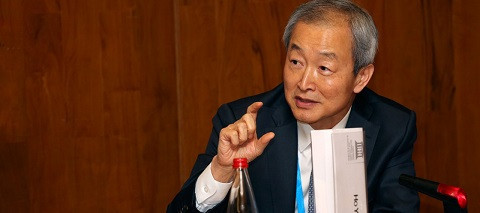
GCED Basic Search Form
Quick Search
أنت هنا
الأخبار

Photo: Ho-Young Ahn, academic and Korean diplomat.
“What are the world’s most pressing challenges?” asks Ho-Young Ahn, academic and Korean diplomat. “For obvious reasons, the pandemic. Then, of course, climate change. Summers are getting hotter everywhere, and natural disasters more often and more serious. Climate change weighs very heavily on my mind. And the third is international security. The observations for this are becoming more and more worrisome.”
These trends, he says, highlight more than ever the need for international cooperation.
“Let us just think about the pandemic – this is a transnational challenge,” says Ho-Young. “We cannot respond to it alone. Well, of course, we can try, but if we work together, that will be far more efficient. The same thing must be said about climate change and our security challenges. We could be dealing with them at a national level, but we can do it far better if we do it together.”
The transnational nature of these challenges is one of the reasons, according to Ho-Young Ahn, that multilateralism remains so relevant. As we celebrate the 75th Anniversary of the United Nations, he says we should take a moment to reflect on the role of multilateralism since the United Nations was established.
“Let us think about the meaning of multilateralism after seventy-five years. Even before the war was over, world leaders had a vision of what international cooperation would look like afterward. And now, thinking about our transnational challenges, multilateralism is more important than ever. Overall, I am very thankful for how the United Nations has functioned over the past seventy-five years.”
Results of the UNESCO’“World in 2030” survey indicate that while a strong majority of respondents believe that international cooperation is vital to address our global challenges, many also have low confidence in the world’s ability to respond. To this, Ho-Young Ahn offers some advice.
Rather than saying we can’t do it – we must ask how we can do it. First, we have to think about all the United Nations has done since its inception. Think about where we started. Then we need to come up with concrete solutions to challenges and demonstrate them to global citizens.
-- Ho-Young Ahn
Besides its multilateral role, it is in such concrete solutions that UNESCO can provide tangible tools for peace building. To this end, UNESCO’s interdisciplinary mandate is a strong platform to start with.
“From day one, building peace has been the most important issue for the United Nations. And for UNESCO, it is literally in the mandate, ‘building peace in the minds of men and women’. Thinking about UNESCO’s areas of work – education, science, culture – are they separate issues? I don’t think so. I think they are inseparable. UNESCO’s strength is that you combine them with peace as the goal.”
Global citizenship education a vital tool for peaceful societies
“Access to education, science and culture must be used for building peace, not sowing the seeds of hatred,” says Ho-Young Ahn. “For instance, following the Korean War, Korea was in great need. It put a big emphasis on education as a way of building back, but it did not have the resources to do so. UNESCO came in, and they gave us what we needed. All those textbooks – they were printed on printers provided by UNESCO.”
UNESCO’s concrete actions serve a higher mandate of peace-building. In a global context of transnational challenges, UNESCO can tap into the spirit of multilateralism – global cooperation – to help deliver this. One key tool it has at its disposal is global citizenship education.
“UNESCO has been promoting this idea of global citizenship education, and it is right to do so. But why is global citizenship education important? Take climate change. A typical discussion surrounding this challenge is that of ‘economy versus climate change action’. This dichotomy occupies the minds of many people – and yet it is not true! One way to communicate this is by strengthening global citizenship education, so that we can see ourselves as global citizens dealing with transnational problems.”
One area UNESCO can work in, says Ho-Young Ahn, is advocating for global citizenship education to be incorporated in national curriculums. UNESCO is one of the most trusted voices on education, he says, and therefore has a duty to help children broaden their perspective and become global citizens.
Children learn in their civics classes what it means to be a good citizen in their societies. This horizon must be extended so they can become transnational citizens – good citizens of the world.
-- Ho-Young Ahn
Being a global citizen means understanding the international nature of contemporary challenges, and helping contribute globally to more peaceful, tolerant, inclusive, secure and sustainable societies. This 75th Anniversary of the United Nations gives us an opportunity to reflect on this, and on how multilateralism and global citizenship can work together in the face of transnational challenges.
“There is no shortage of transitional challenges. And we need a new perspective on them. Well – not a new perspective. We have known for seventy-five years that the challenges we face are global. We just need to be committed to addressing them together.”
URL:
https://en.unesco.org/news/our-most-pressing-transnational-challenges-must-be-addressed-together
